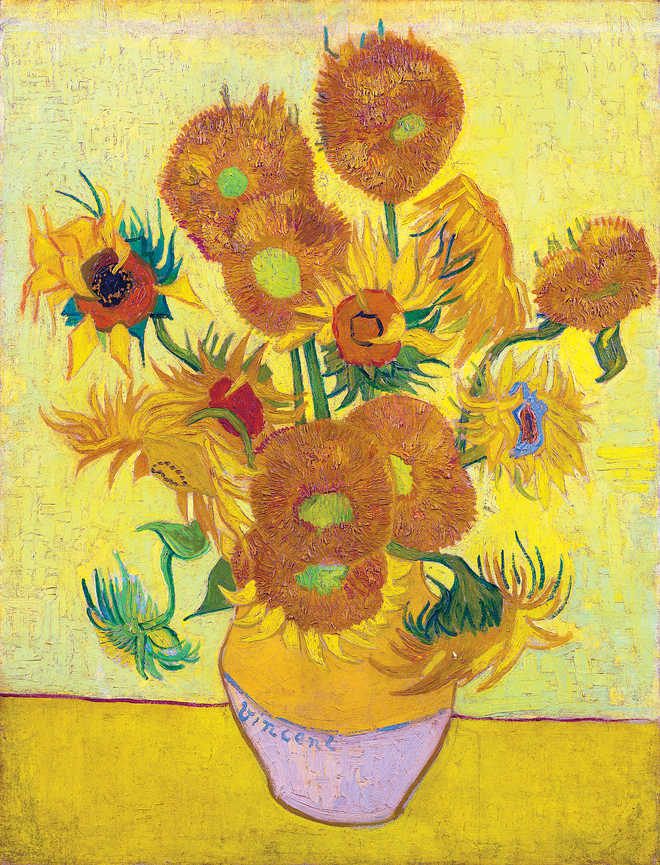
Yellow for life: From Sunflowers series.
Joe Sommerlad
Vincent van Gogh’s style is instantly recognisable and his most famous works Sunflowers (1887), Cafe Terrace at Night (1888) and The Starry Night (1889) are among the most revered in the world, attracting crowds to galleries for more than 100 years and appealing as readily to connoisseurs as they do to the merely curious.
A living embodiment of the tortured artist archetype, Van Gogh was known for his irascible temper and restlessness and famously severed a sliver of his own ear with a cutthroat razor in the midst of a manic depressive episode in Arles, Provence. His subsequent self-portrait, complete with bandage, today hangs in London’s Courtauld Gallery.
Despite being just 37 when he fatally shot himself in the chest in a wheat field outside of Auvers-sur-Oise, northwest of Paris, Van Gogh left behind more than 1,900 paintings and sketches and remains a figure of enormous fascination.
Perhaps the greatest clue to his peculiar character is revealed through the letters he sent to his younger brother Theo (1857-91), who supported Vincent financially and emotionally throughout his life and steered him towards painting following false starts in England and as a Protestant missionary to the coalminers of Borinage in Belgium. It was Theo, a successful art dealer, who first brought his erratic sibling to Paris in 1886 and introduced him to the leading lights of the Post-Impressionist movement.
Vincent wrote 663 letters to his brother over the course of his life, with 39 of Theo’s replies surviving. The latter’s widow, Johanna van Gogh-Bonger, spent many years compiling them after both men had passed away and finally published a collection in 1914. Her work was instrumental in securing Vincent’s legacy. The letters between them, written with “wry, stormlit eloquence” as critic Julian Bell observes, almost always find Vincent either appealing to Theo for money or thanking him for the gift of a 50 franc note.
Vincent, four years older, had shaped Theo’s tastes in art and literature during their childhood growing up as parson’s sons in Zundert and he continued to offer friendly advice in adult life: “I must recommend that you start smoking a pipe. It does you a lot of good when you’re out of spirits, as I quite often am nowadays.” The correspondence is always affectionate and often earthily humorous as Vincent reflects on the world as he finds it.
“The love between two brothers is a great support in life. That's an age-old truth. Let the fire of love between us not be extinguished but let instead the experience of life make that bond even stronger. Let us remain upright and candid with each other. Let there be no secrets, as things stand today,” Vincent writes.
Joking about their sister Wilhemina, he says: “She has neither drunk nor led a wild life, and yet we know a photograph of her in which she has the look of a madwoman.”
The letters are lined with descriptive passages that reveal the extraordinary eye for detail Vincent would later bring to the canvas: “The ground and the piles of timber in the yard were drenched, and the sky reflected in the puddles was completely golden due to the rising sun, and at five o’clock one saw all those hundreds of workers looking like little black figures fanning out on all sides.”
They also commonly feature shaded pencil sketches of his latest project, with Vincent explaining to Theo his intentions for the piece then underway.
He tells him the dank palette of The Potato Eaters is designed to evoke, “the colour of a good dusty potato, unpeeled of course.”
Vincent’s frankness about self-doubt and the creative process is sometimes staggering: “You don’t know how paralysing it is, that stare from a blank canvas that says to the painter you can’t do anything. The canvas has an idiotic stare, and mesmerises some painters so that they turn into idiots themselves. But however meaningless and vain, however dead life appears, the man of faith, of energy, of warmth, and who knows something, doesn’t let himself be fobbed off like that. He steps in and does something, and hangs onto that, in short, breaks, ‘violates’ — they say.”
Taken together, the letters illuminate Van Gogh’s working life, motivations and personality to a degree no biography could hope to approach. They also reveal this brittle, brilliant man’s dependence on his brother, whose unwavering support speaks of a deeply felt fraternal love as well as a profound fear for Vincent’s future, an almost unbearably moving subtext to their exchanges.
When Vincent could live with himself no longer and reached for his revolver on 27 July 1890 — perhaps having come to feel he was a burden to Theo, now supporting a young family — he did not die immediately and staggered home, bleeding profusely, to the Auberge Ravoux inn where he was attended by two doctors who fought gallantly to save his life. Theo was sent for and arrived from Paris to find Vincent smoking peacefully in bed awaiting the end. His final words, whispered to his brother through a cloud of tobacco, are simply devastating: “The sadness will last forever.” Theo, inconsolable after Vincent’s death and blaming himself for having somehow failed him, was taken ill with syphilis and passed away in Utrecht just six months later. He was buried there but later exhumed and laid to rest beside Vincent in France. He was just 33.
— The Independent



























